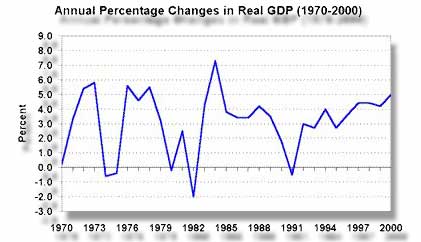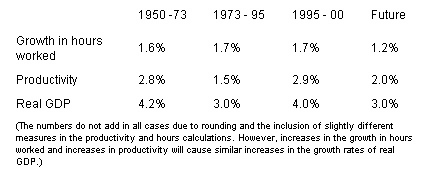|
|
|
|
Breaking down the brainwashed perception of GDP and Productivity |
|
| Nipawin - Friday, August 30, 2002 - by: Mario deSantis | |
|
real |
Whenever I see the statistical continuous growth of the Gross Domestic Product (GDP) of the United States I ask myself if this growth of economic wealth is ‘real’ or not. Whenever I see the statistical continuous growth of the productivity rate of the United States I ask myself if this productivity growth increases the wages and happiness of the American people. When I realize that our Canadian politicians, our Canadian economists and our Canadian big businesses pledge to overcome the standard of living of the American people by copycatting the American economic policies I feel sick. |
|
|
|
|
143% |
I assert that the continuous growth of the GDP in the last thirty years has not created real wealth at the same rate as it is statistically measured. In fact it is preposterous to believe that the GDP can increase indefinitely, yet our classical economists ass-u-me that the GDP increases indefinitely under their expert directions. In ‘real’ 1996 US dollars, statistics show an average GDP annual growth in excess of 3%; this means that in the last thirty years ‘real’ GDP increased in excess of 143%. You ask any neo-classical economist if our material growth increased by 143% in the last thirty years and he would tell you the ‘real’ answer: yes. You ask the same question to a fifty five year old worker and you will hear a real answer. |
|
|
|
|
56% |
Productivity represents the amount of goods and services (in real terms) produced per hour of labour. In the last thirty years productivity increased at a rate in excess of 1.5% per year; that is our average worker is able to produce at least 56% more GDP than what he was able to produce thirty years ago. You ask any neo-classical economist if the increased productivity provided a 56% increase in the standard of living in the last thirty years and he would tell you the ‘real’ answer: yes. You ask the same question to a fifty year old worker and you will hear a real answer. |
|
|
|
|
perception |
Recently, James Baker, a stakeholder of the Carlyle Group along with the Bush family, speaking on the present never ending debate to attack Iraq has stated that "perception is sometimes more important than reality." James Baker has it wrong, our individual perceptions are our realities, and that is why it is important that we don’t get brainwashed by lying politicians, greedy neo-classical economic gurus and deceptive mainstream media. We must not maintain the brainwashed perception that the economic and social growth rests with the numbers of the GDP and with the numbers of Productivity. |
|
|
|
|
we are |
Yesterday, August 29, 2002, I read the article "Globalization Fails to Deliver the Goods" by social economist Mark Weisbrot. In this article Weisbrot states |
"the real median wage in 1973 was $12.45 (measured in 2000 dollars). In 2000 it was about $12.90." |
|
| Jeff Gates, author of the book "Democracy at Risk," reports that | |
"the typical American now works 350 hours more per year than a typical European, almost nine full weeks." |
|
|
|
|
|
people |
The growth of both the Gross Domestic Product (GDP) number and Productivity number are not evidence of growth in our welfare. The growth in our welfare rests not in numbers but in people, the growth in our welfare rests therefore with opeace, learning, education, employment, and health care. |
| References: | |
| A Case Study: Gross Domestic Product - May 2001 National Council on Economic Education http://www.econedlink.org/lessons/index.cfm?lesson=EM170 | |
| A Case Study: Productivity - May 2001 National Council on Economic Education http://www.econedlink.org/lessons/index.cfm?lesson=EM180 | |
| The Right Way to Change a Regime By JAMES A. BAKER III, New York Times, August 25, 2002 http://www.nytimes.com/2002/08/25/opinion/25BAKE.html?todaysheadlines | |
| Ownership Statistics: Why a Shared Capitalism is Needed... Jeff Gates and Christopher Mackin http://www.sharedcapitalism.org/scfacts.html | |



